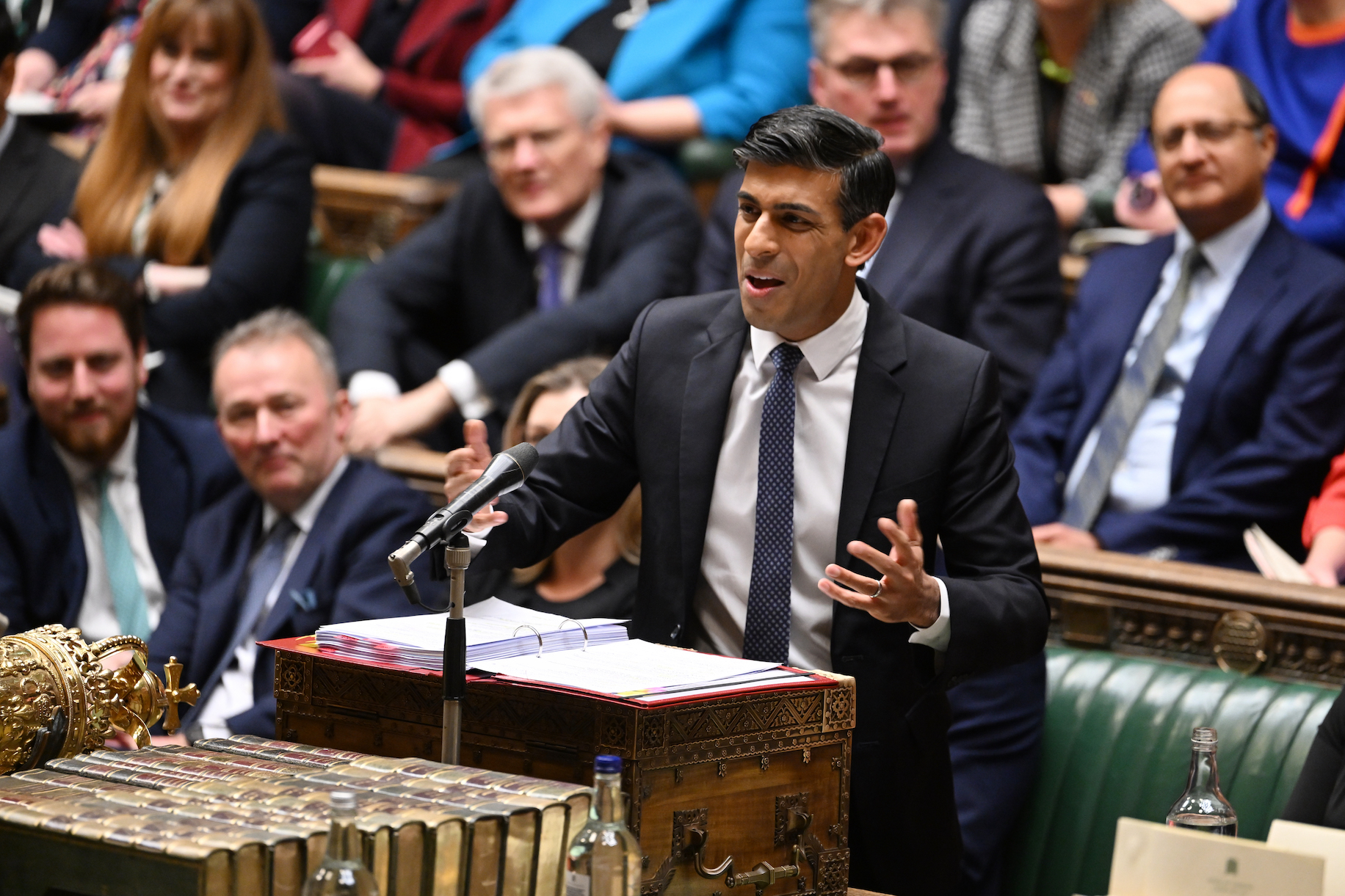Six months ago to the day, Rishi Sunak entered No 10 Downing Street as prime minister for the first time. Preceded by six weeks of exile following his bruising campaign defeat in the summer to Liz Truss, it is difficult to overstate how significant a political comeback this was. But as pensions funds teetered and Britain’s financier class grumbled, the core tenets of his fiscal philosophy had been vindicated.
Careful not to be seen as gloating, Sunak’s face was graven with seriousness — even the wave was sullen. There was a political message too: if the previous occupant of No 10 had been over-caffeinated, her administration bloated on ideology, the new regime would be as stolid as it was bloodlessly technocratic. “Cheer up Rishi!”, one journalist shouted as the famous black door of No 10 shut.
Today, you rarely see Sunak without a smile on his face.
Indeed, the prime minister’s toothy grin provides an aesthetic quality to Westminster’s newest narrative: that the PM — having delivered on the Windsor Framework, AUKUS developments, a gaffe-free Budget, CPTPP and trade union pay deals — is riding high on achievement. In this view, not only has Sunak thwarted the endless sense of scandal and ceased the Conservative party’s constant reboots — some of his MPs are starting to dream of election victory next year.
New guide to religion in schools in response to tumbling parent religion figures

MDU appoints criminal law specialist to head legal team
Of course, when it comes to success, it helps to mark your own homework. At the start of the year, the prime minister unveiled five promises he wanted to be judged by come the next election: halving inflation, cutting NHS waiting lists, growing the economy, bringing down the national debt and stopping the small boats carrying asylum seekers across the English Channel. “No tricks, no ambiguity — we’re either delivering for you or we’re not”, the PM said in January.
The prime minister’s approach has therefore been obvious: take problems a few at a time (guided naturally by what is politically propitious), set priorities you think you can hit, tackle them methodically and exalt your success.
Six months in and, tellingly, the “five priorities” have entirely consumed government. Ask the prime minister about his political philosophy, or what good government means to him, and he will point to his pledges. Every policy announcement, every ministerial statement is framed with the “priorities” in mind. If Sunak’s team has any say in his setting, the pledges are writ in the blue backgrounds before which the prime minister speaks. It is government by permanent campaigning — and the prime minister, to his credit, is relentlessly on message.
Crucially, there is some sense that Labour’s poll lead over the Conservatives is falling as a result. One poll in mid-April, carried out by Redfield & Wilton Strategies, put Labour on 44 per cent, down by one point on the previous week, and the Conservatives on 30 per cent, up by two points. And Politico’s “poll of polls” has the average gap between Labour and the Conservatives at 14 percentage points.
When Sunak took office on October 25, Labour’s average lead in the same poll tracker was 27 points. It means after months of Labour leads in the 20s or even 30s, Sir Keir Starmer’s advantage seems to be clustering instead in the mid teens.
However, it is worth qualifying this view of a polling “revival” under Sunak significantly.
These figures suggest that the Conservative party has recovered to levels seen prior to the mini budget in September. On 25 September, the day of then-chancellor Kwasi Kwarteng’s “growth plan”, the Conservatives’ polling lead was 12 points. It suggests, merely, that Rishi Sunak successfully prised out the “premium” Trussonomics imposed on the Conservative party’s already dire polling performance.
This highlights a dilemma for the prime minister. For after the blitz of policy on Brexit, trade, immigration, strike deals, where does the prime minister find his next policy heave to continue his polling climb? The answer, unfortunately for the PM, cannot be “small boats”.
“Stopping small boats” was always the most politically sensitive and least vague of Sunak’s five pledges. As Paul Goodman pointed out during the PM’s recent interview with ConservativeHome, the crossings commitment is hardly vague. “You pledged to ‘stop the boats’”, Goodman told Sunak, “not reduce the number, not bring the number down — actually to stopping them”.
With no choice but to deliver on these terms, the prime minister has been placed in a constant state of “clamping down” on channel crossings. First came a new £60m deal with France to increase surveillance of French beaches, and then came the illegal migration bill which says that anyone who arrives in the UK by “small boat” with be “detained and swiftly removed”.
The illegal migration bill returns to the House of Commons for its report stage and third reading tomorrow, when MPs will consider further amendments which have been examined in committee. In a bid to silence rebellion from within his own ranks on the matter, the prime minister has agreed an amendment with the “common sense” group of right wing Conservative MPs which would empower the home secretary to ignore “interim measures”, under Rule 39 of the Rules of European Court of Human Rights.
Avoiding rebellion through backroom negotiations has of course been a common theme of Sunak’s premiership, seen before on central housing targets and onshore wind. It is a strategy that ensures inter-Conservative party disagreements are not aired out in the open — but the cycle of rebellion turn concession takes its toll politically in time. It creates incentives for wannabe backbench activists to make noise for their chosen cause, given a meeting in No 10 and a concession will likely result. On “small boats” in particular, with the issue so salient in our politics thank to Sunak’s consummate oath-swearing, the PM will in all likelihood be pushed into taking more and more extreme positions on matters like the ECHR. Six months in and its clear small boats remain Sunak’s glaring vulnerability.
Outside of Westminster, too, there are some key indicators worth remembering. There are seven million people currently waiting for treatment on NHS waiting lists; inflation is not falling as quickly as had been predicted; and, on economic growth, the International Monetary Fund (IMF) forecasts that Britain faces the bleakest two years of any major industrial nation. Much has been made of the UK’s entry into the CPTPP, but based on the government’s own estimates, the deal will raise long-term domestic GDP by just 0.08%.
The recent Raab affair, likewise, is a reminder that there can always be further skeletons lurking in the Conservative closet.
In the end, shifting perceptions only take you so far. As the Conservative party prepares for 1000 seat losses in next month’s local elections — with party chairman Greg Hands and new deputy prime minister Oliver Dowden openly declaring as much — Sunak’s narrative of revival looks set for a significant collision with electoral reality.
Tellingly, with the local elections less than ten days away, Sunak has done little to no campaigning (apart from the odd concerned look directed at a pothole) and the national media was not even invited to the party’s campaign launch in Wolverhampton on March 24. The question for Sunak is how does he maintain the narrative of revival at Westminster amid such an electoral thumping as is expected in May. The Sunak adulation bubble, it seems, may be about to burst.
Peak Sunak?
Right now, the big picture story of Sunak’s first six months has been this: he has restored relative stability after the collapse of the Johnsonian and Trussite regimes, making the Conservatives less unpopular than they were when he took over. But beyond the high political battles between Rishi Sunak and Keir Starmer at Westminster, it remains likely that the next election will take place against a backdrop of strained public services and a variety of sleaze scandals empowered by a legacy of lax standards.
Perhaps this recent period has been “peak Sunak” — a high-water mark of delivery and action on matters squandered by his predecessors — before events, elections and continued economic gloom hollow his revival narrative.





















Discussion about this post